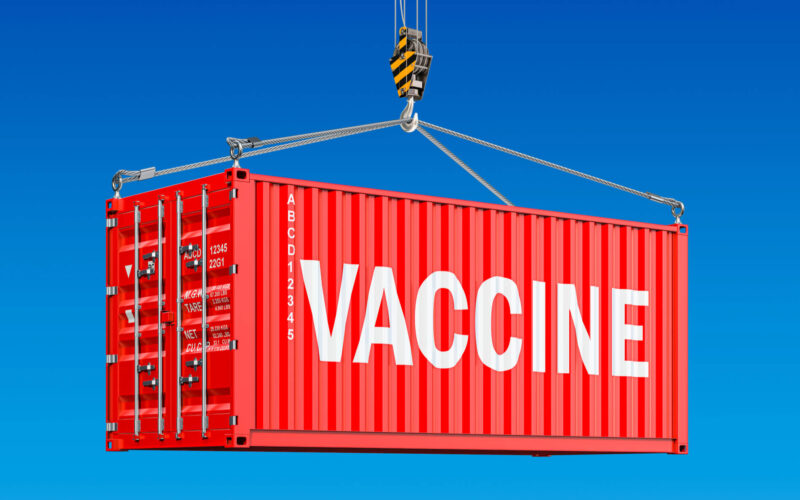Pfizer’s vaccine trial, resulting in more than 90% effectiveness in protecting from the COVID-19 virus, offered a glimmer of hope. Its distribution though, could offer a logistical nightmare.
On November 9, 2020, German biotechnological company BioNTech and US pharmaceutical firm Pfizer announced that their ongoing trial of a coronavirus vaccine was more than 90% effective in preventing COVID-19. After the news about the breakthrough, a lot of airlines witnessed a rise in their shares.
Temperature challenge
Most of the vaccines are fragile and need to be kept in a cold environment (in around 2 to 8 degrees Celsius). Pfizer’s COVID-19 vaccine needs to be stored at minus 80 degrees Celsius and requires an elaborate cold-chain distribution. Governments would need to buy special equipment, such as “ultra low temperature freezers” (prices going up to $15,000 for one). The vaccine also has to be injected within 5 days after reaching the hospitals.
“The new two-shot vaccine from Pfizer has to be maintained at minus 80 degrees Celsius – nowhere on the planet does the logistical capacity exist to distribute vaccines at this temperature,” said Toby Peters, a professor at Britain’s University of Birmingham.
Limited air cargo capacity
Around 4.2 billion people live in countries where vaccines would have to be transported from other parts of the world, according to supply chain consultant from Europhia Consulting.
“For example, to illustrate the massive scale of capacity required, the current population of the United Kingdom is 62 million people,” said consultant. “Around 100 B777 freighters would be needed to transport a vaccine (double doses per capita) to vaccinate the UK’s entire population from a faraway manufacturer. That’s just to serve the needs of one country.”
The International Air Transport Association (IATA) calculated that 8 billion doses to vaccinate the entire global population would require around 8,000 Boeing 747 aircraft. That number would double if two doses per person are required as in the case of Pfizer’s vaccine.
“Even if we assume that half the needed vaccines can be transported by land, the air cargo industry will still face its largest single transport challenge ever. In planning their vaccine programs, particularly in the developing world, governments must take very careful consideration of the limited air cargo capacity that is available at the moment,” said IATA’s director general, Alexandre de Juniac.
The industry was preparing for the distribution of vaccines that need to be kept at temperatures ranging from 2 to 8 degrees Celsius. Pfizer’s vaccine would require a more complicated storage and a bigger deep-freeze warehouse capacity.
Air carriers getting ready
Avia Solutions group, an integrated aviation service provider which controls the operations of Chapman Freeborn, Bluebird Nordic and Avion Express, offered a $2 million budget to the World Health Organization in April 2020. “The support money shall be dedicated to transporting COVID-19 vaccines to highly infected places using the company’s aircraft fleet, Boeing 747-400F, B737-400F and Airbus A321,” Vygaudas Usackas, Ambassador and Member of the Board of Directors of Avia Solutions Group, explained at the time.
Finland’s flag carrier Finnair established a dedicated pharma area located in Helsinki–Vantaa Airport, Finland. Its Cool Terminal has 2600 m² of controlled room temperature space, 208 m² of refrigerated storage and 50 m² of freezer space with constant checks on temperature.
Emirates SkyCargo plans to set up the largest airside facility for cold chain storage and distribution of COVID-19 vaccine. The air cargo carrier has already set up a rapid response team to coordinate requests for the movement of the vaccine.
Ethiopian Cargo, Ethiopian Airlines’ cargo division, announced it was ready for the distribution of COVID-19 vaccine across Africa and the rest of the world. With a capacity of 1 million tons, the company has the largest cargo terminal in Africa as well as temperature-controlled storage facilities at its Pharma Wing.
Air France KLM Martinair group along with Air Cargo Netherlands, Amsterdam Schiphol Airport and with Aéroport de Paris established two task forces to prepare both airports communities for upcoming vaccine transport operation. Amsterdam Schiphol Pharma Hub opened a 1,118 m² climate-controlled storage facility and is building a cool room of 2,061 m². Charles de Gaulle Pharma Hub is finishing its new climate-controlled storage area too.
Other potential vaccines, still undergoing trials, such as those from Johnson & Johnson and Novavax, can be stored at between 2 degrees and 8 degrees. If effective, they could mean simpler logistics for ground and air transport.

